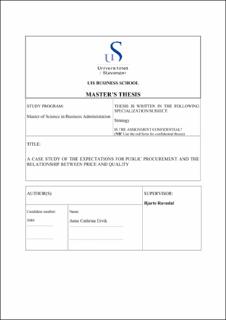| dc.contributor.advisor | Ravndal, Bjarte | |
| dc.contributor.author | Ervik, Anne Cathrine | |
| dc.date.accessioned | 2021-02-17T10:21:44Z | |
| dc.date.available | 2021-02-17T10:21:44Z | |
| dc.date.issued | 2020-04 | |
| dc.identifier.uri | https://hdl.handle.net/11250/2728627 | |
| dc.description | Master's thesis in Strategy and Management | en_US |
| dc.description.abstract | The government spends 500 billion NOK on Public procurement each year. This amounts to 16 % of the total gross revenue. Both the government and the public have great focus on this money to be spent in an economically advantageous way. The introduction of new public management in public governance was a way to introduce a business mind set, and run government entities more like a business, to inspire cost saving and financial control.
My research was conducted as a case study with three cases using relevant theory and the rules and regulations for public procurement as a foundation. It started with as an aspiration to gain a better understanding of why price seemed to be the determining factor for procurement competitions where it publicly had been stated that quality should be the determining factor. For all cases quality had the highest weight and yet the offer with the low price was awarded the contract. The public dialog about these procurements made it sound like quality had been sacrificed for a low price, and part of me expected that to be in my findings. What I found was that in a competition with negotiations the principal is able to guide suppliers towards the optimum quality. The offered quality from suppliers become more similar, thus making price the factor were suppliers can differentiate themselves in the evaluation. The fact that price becomes the determining factor does not weakening the importance of quality for the procurement. During my research I found all contract awards conducted according to basic procurement principles and I started to wonder - why is it that we have such different expectations for the result of a public procurement and what it should deliver? Expectations isn't only for the government to spend our money wisely, it often seem like there is an expectation that one should get the best quality at the lowest price. I decided to explore what it is that influence these expectations, and what it is that separate public and private procurement practises.
I noticed that even if I have a background from procurement, my view and expectations of the results of public procurement competition should achieve, are influenced by different stakeholders communication and the media coverage. My own personal conviction could also have been part of clouding my judgement, making me assume that quality had been sacrificed for a low price when in reality the quality for all three cases were quite similar. Choosing the economically most adventurous offer is what we based on theory expect and yet we let feelings cloud our judgement when it comes to viewing the results for public procurement. | en_US |
| dc.publisher | University of Stavanger, Norway | en_US |
| dc.relation.ispartofseries | Masteroppgave/UIS-HH/2020; | |
| dc.rights | Attribution-NonCommercial-NoDerivatives 4.0 Internasjonal | * |
| dc.rights.uri | http://creativecommons.org/licenses/by-nc-nd/4.0/deed.no | * |
| dc.subject | økonomi | en_US |
| dc.subject | administrasjon | en_US |
| dc.subject | strategi og ledelse | en_US |
| dc.title | A case study of the expectations for public procurement and the relationship between price and quality | en_US |
| dc.type | Master thesis | en_US |
| dc.subject.nsi | VDP::Social science: 200::Economics: 210::Business: 213 | en_US |

